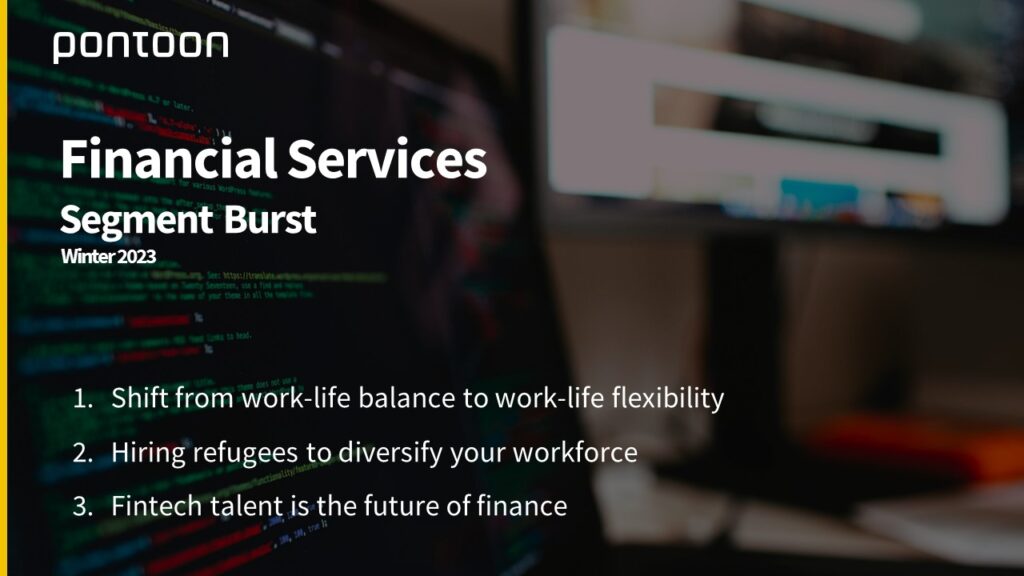Financial Services Segment Burst: Winter 2023
Research
.
In the Winter 2023 Financial Services Segment Burst, we explore the most recent trends in the sector.
-
The shift from work-life balance to work-life flexibility
-
Hiring the world’s refugees to diversify your workforce
-
Why fintech talent is the future of finance?
Shift from work-life balance to work-life flexibility
Hybrid and remote working models within the financial services industry have increased the need for greater flexibility in how and when people work. Traditional models of work-life balance within a 9-5 framework are shifting to more flexible options as workers look to seamlessly integrate their personal and professional lives.
However, balancing business needs and worker demand for more flexibility remains challenging for many organisations. With growing economic uncertainty, return to in-office work continues to be an issue of contention between employees and employers.
Despite the widespread desire amongst financial services talent to work remotely – 35% want this as a full-time option – it’s unlikely that their demands will be met in 2023. Research suggests that 90% of employers will require staff back onsite, which might potentially expose them to talent shortages. Companies must re-evaluate how they approach flexible working styles to attract and retain top finance professionals.
Financial services leaders should foster an environment that best serves the needs of both employees and employers by implementing flexible working hours, allowing staff to work remotely as needed, and letting staff pivot into part-time roles.
Providing access to childcare, offering personal coaching services, and creating an atmosphere where employees feel empowered to manage their own projects are also excellent methods of increasing job satisfaction – a necessary component of higher retention rates.
Hiring refugees to diversify your workforce
As ongoing international conflicts displace local populations across the globe, talented professionals are now searching for safe places to live and work. However, refugees face significant challenges in the job market.
These challenges include language barriers, credential certification issues, and a lack of professional networks to enhance career opportunities.
To help support the economic integration of refugees, many financial services organisations have begun to recognise the potential of hiring displaced persons. For example, global investment firm Blackstone has committed to creating employment opportunities for 2,000 refugees globally, including 1,500 in the US, over the next three years.
These efforts are part of a global network of 260 businesses organised by the Tent Partnership for Refugees (Tent).
Refugees possess valuable skills necessary for success in today’s digital banking industry. These skills include experience in finance, customer service, technical operations, asset management, and other areas related to online banking. Furthermore, many displaced persons often speak many languages, which can be an asset to companies serving multicultural customers.
To access this largely untapped pool of workers, employers must launch special initiatives geared towards recruiting and training refugees for various positions within the finance industry.
Companies should also strive to make their workplace more welcoming by considering how they can best integrate newly hired foreign employees into existing working environments. This could involve providing additional training opportunities specific to new hires’ cultural backgrounds or other language services for those with limited English proficiency.
Implementing such measures shows that your organisation values workplace diversity and fosters a strong sense of belonging for all workers.
Fintech talent is the future of finance
Fintech is becoming an increasingly popular career option for tech talent who want to work in the financial sector. As companies from retail banking to investment firms look for new, innovative ways to streamline their digital strategy, the demand for these highly skilled professionals will continue to rise.
According to McKinsey, fintech jobs in Europe are forecasted to grow by 2.7% to more than 364,000 roles in 2023. Careers in data analysis, software engineering, coding, investment analysis, and artificial intelligence remain popular among job seekers.
Finding the right talent can be tricky, so employers must take proactive steps. If you’re looking for recruits with skills suited explicitly to this rapidly expanding industry, consider the following:
Understand the skills needed. Before beginning your recruitment process, it’s essential to understand which skills are necessary for success in fintech roles. Research into the current job market will help you identify what kind of worker you need and what skillsets should be targeted.
Leverage networking opportunities and referral schemes. Networking is an invaluable tool when it comes to finding potential candidates for any fintech role. Asking current employees for referrals via company intranet or reaching out to industry contacts via LinkedIn or during industry events are great options for sourcing new talent.
Offer competitive pay and benefits. Remember that fintech workers choose from many different opportunities that offer better compensation packages than other sectors. Do your research on current market rates and how they vary by role. This will ensure your offer stands out from the competition.
“Fintech advancements are rapidly changing the financial sector, creating an increasing need for tech talent. Companies must act now to determine and source skill sets necessary to keep up with these digital disruptions.” Kelsey Williams – Senior Director Financial Services at Pontoon
Ultimately, recruiting for fintech roles requires research and careful consideration of the skills, benefits, and sourcing strategies needed to attract the best candidates. Keeping current with market trends will help hiring managers recruit top talent in this fast-paced talent market. Additionally, employers can offer industry-specific training opportunities, resources, and mentorship programmes to foster a welcoming workplace for new, talented professionals.
Related Post
In the Winter 2023 volume of Industrials Segment Burst, we explore the most recent trends in transportation.
Global aviation industry hiring trends
In 2023, the aviation industry will be back in the ...





